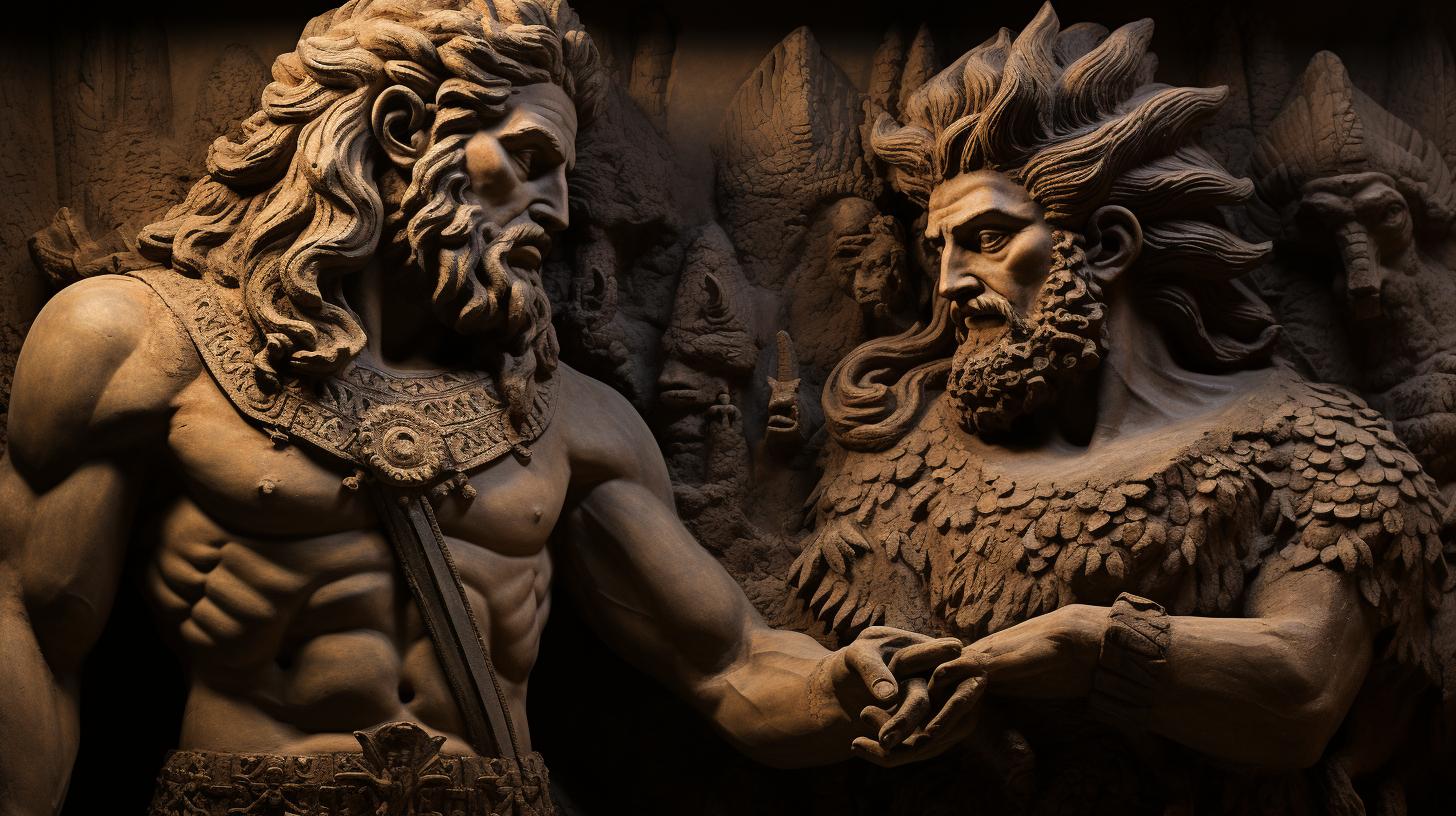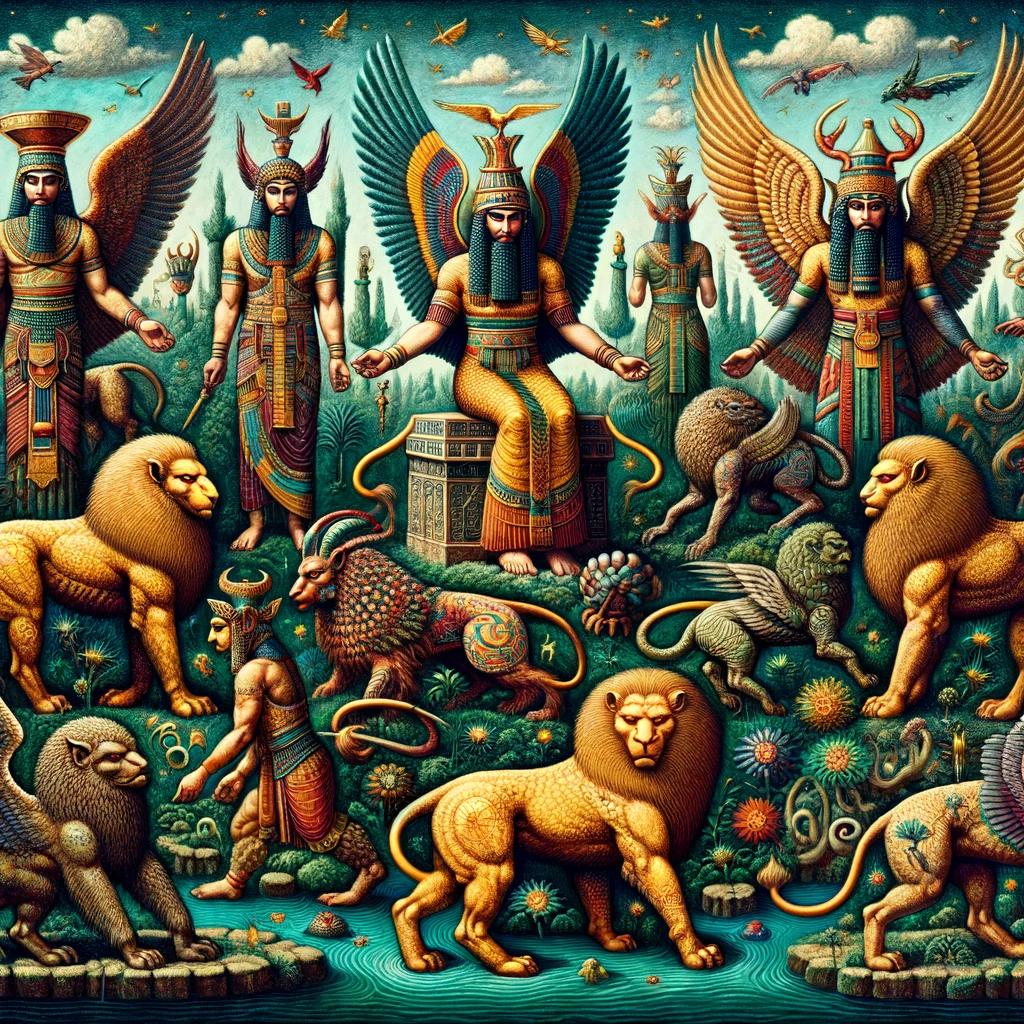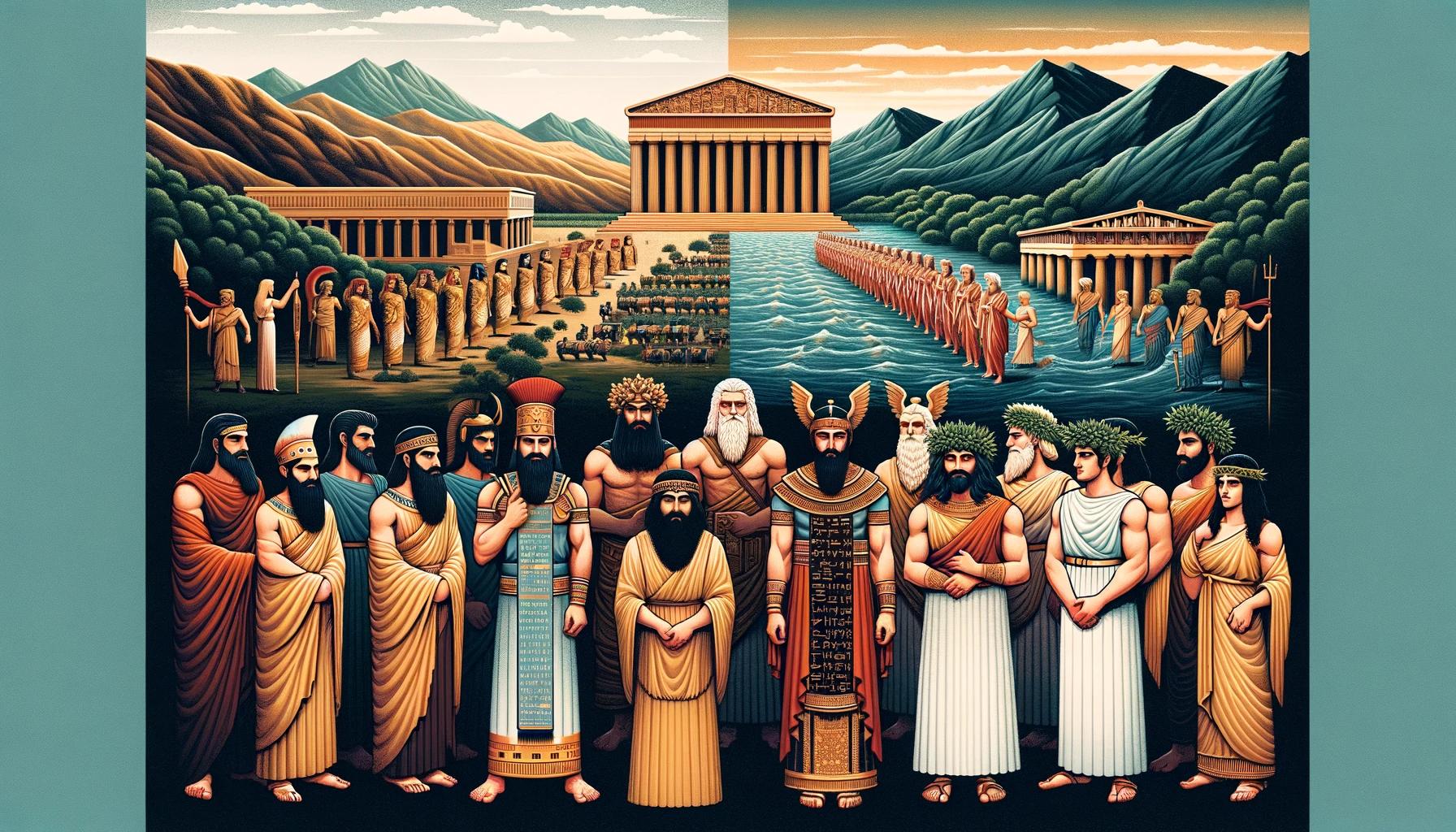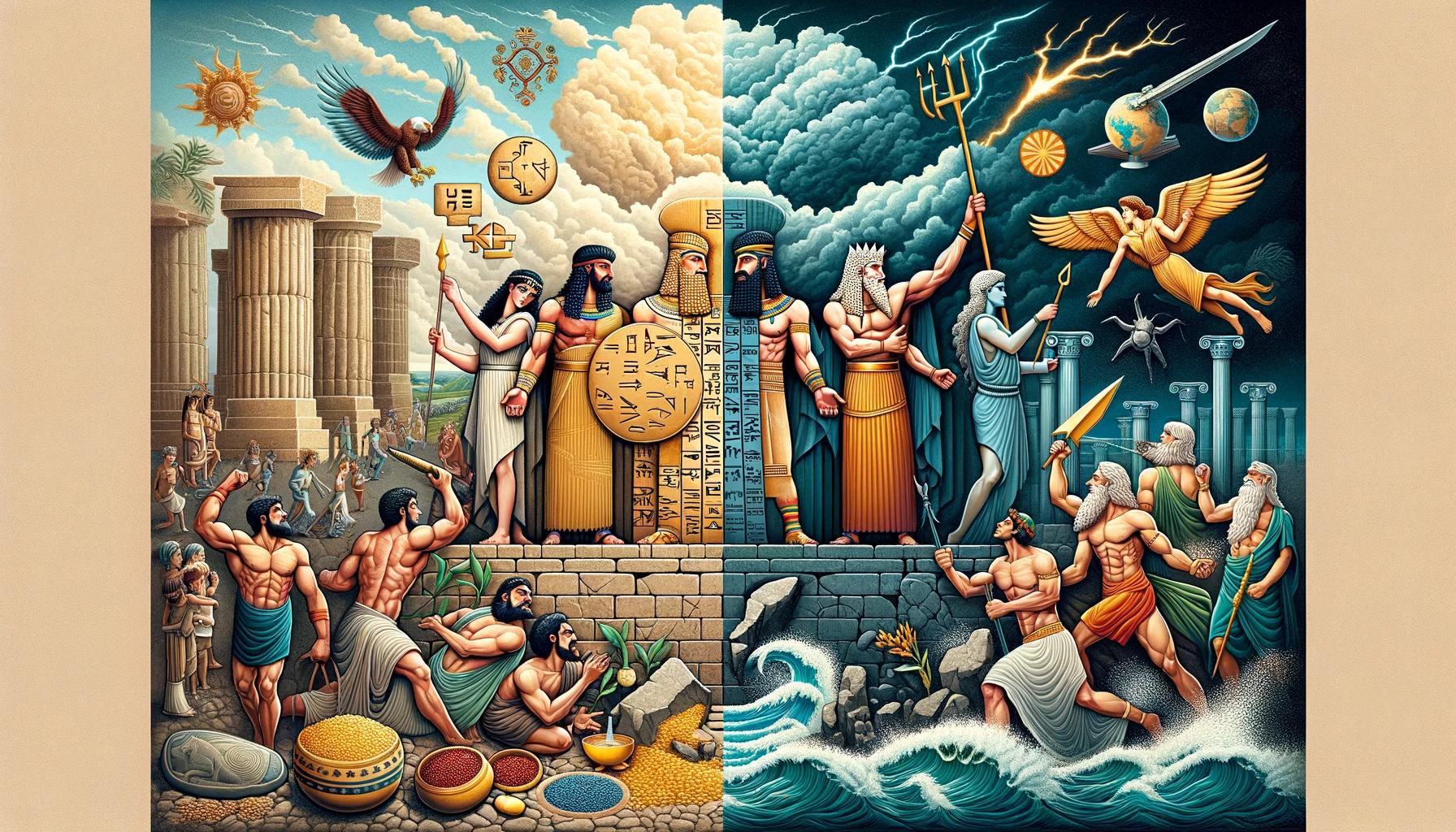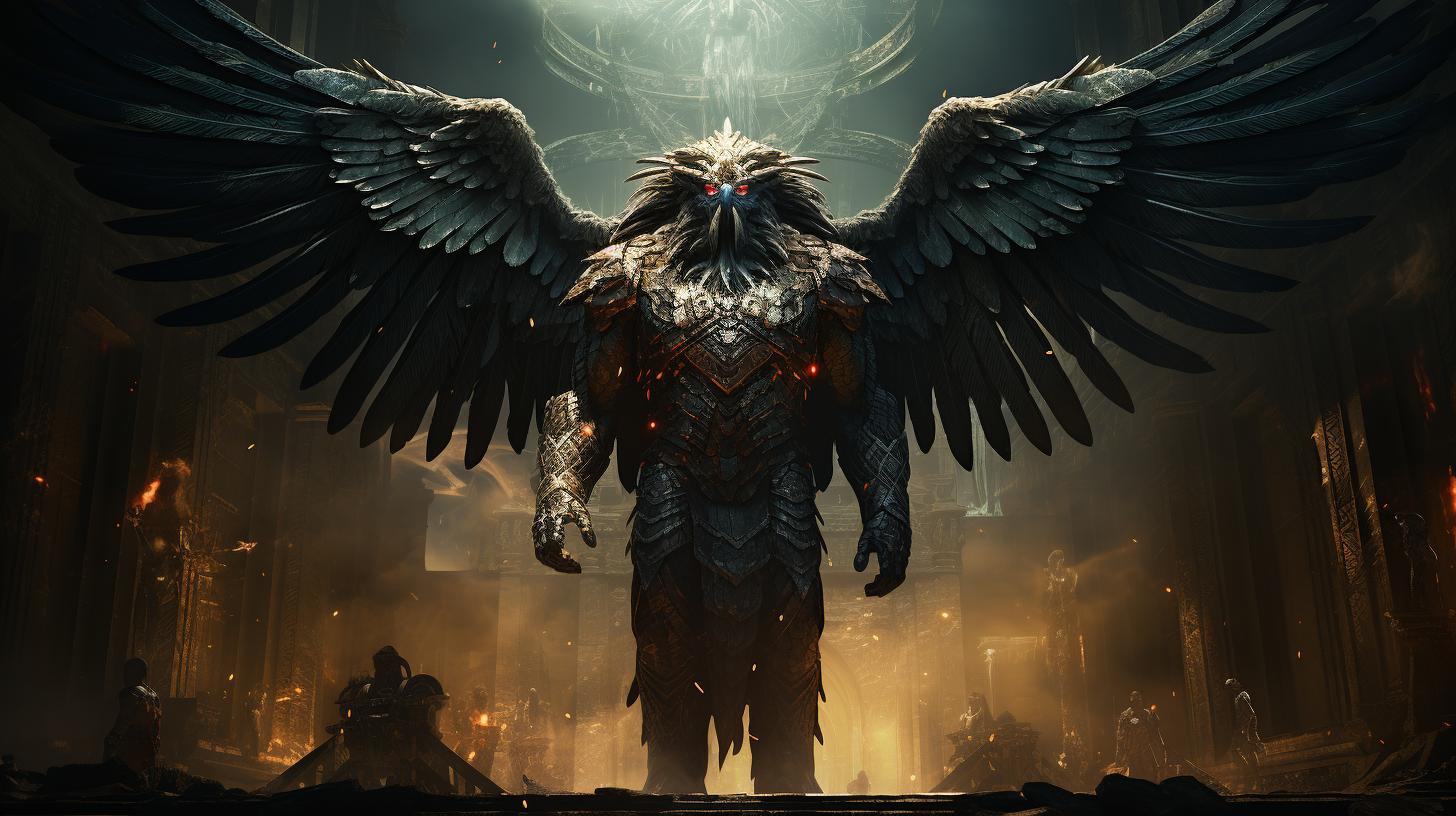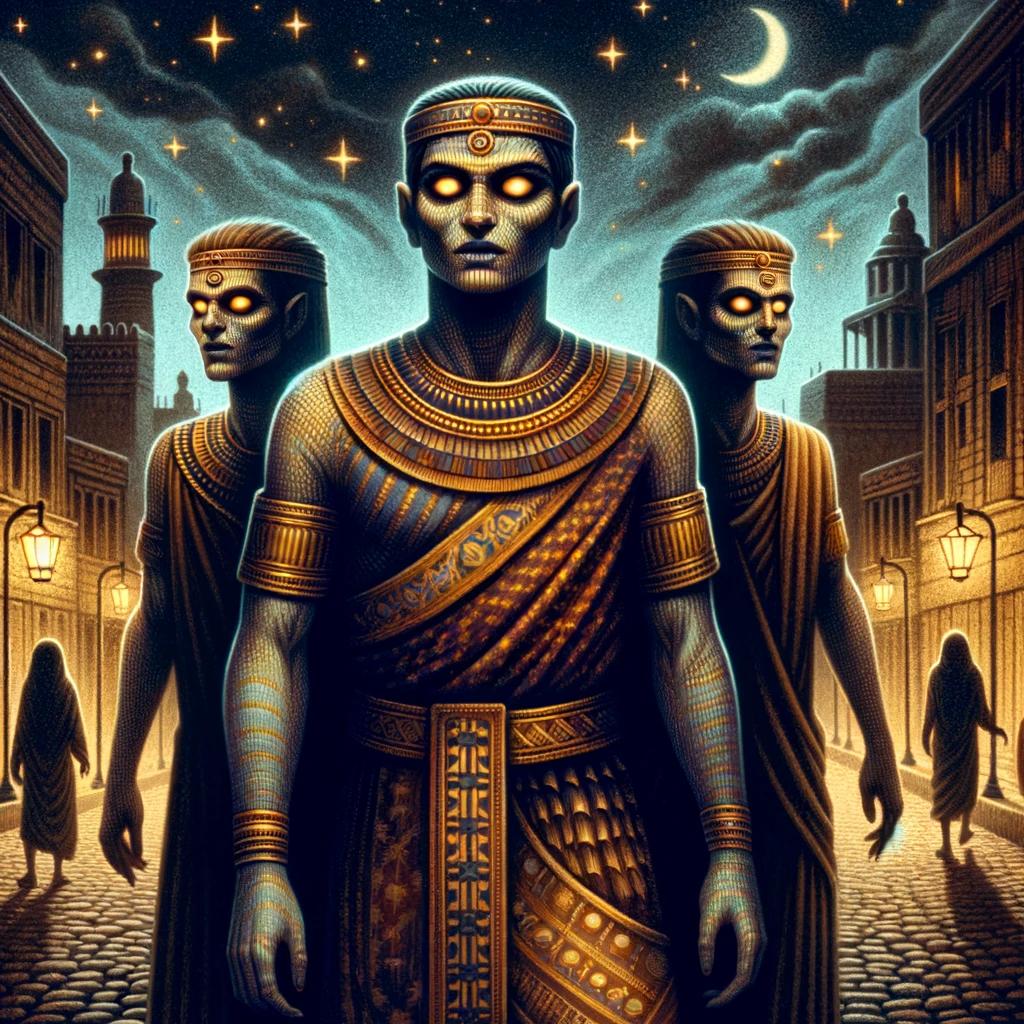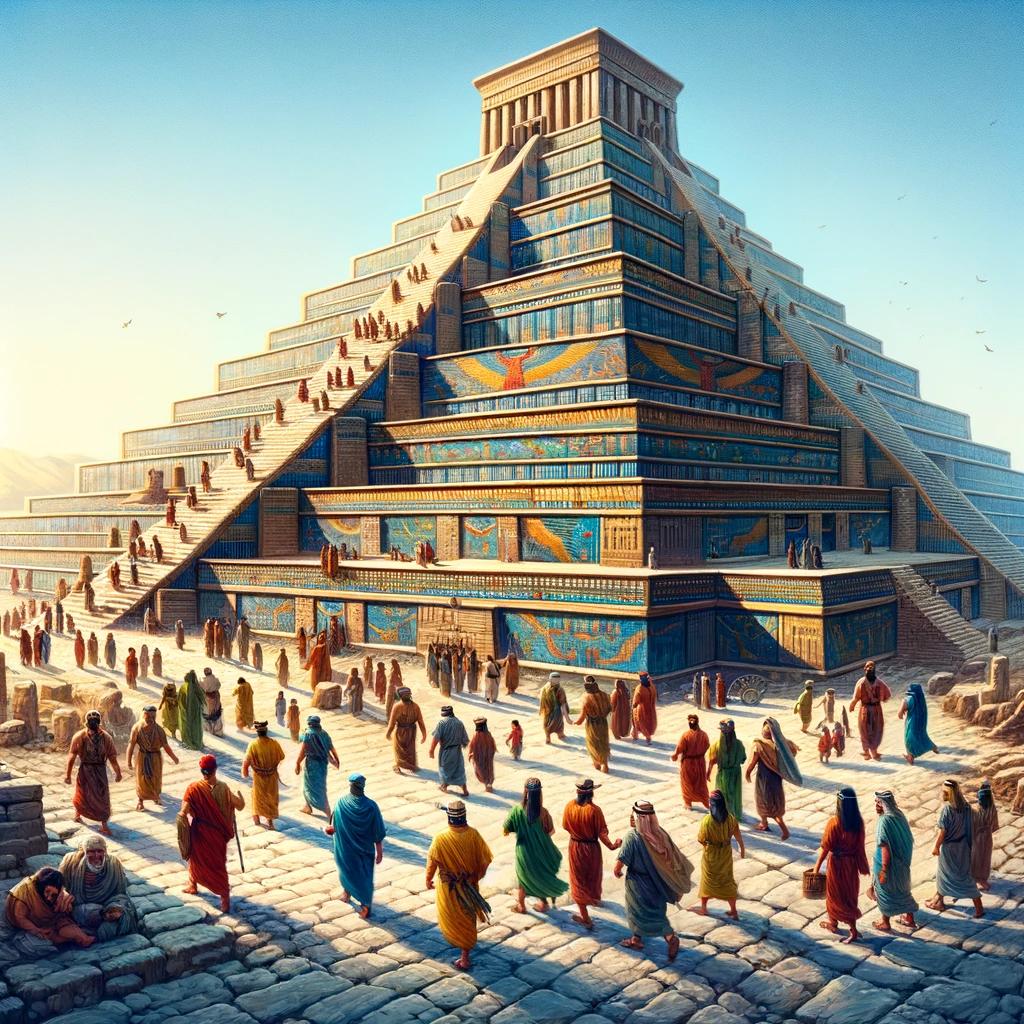Gilgamesh and the Bull of Heaven: The Epic Battle Unleashed!
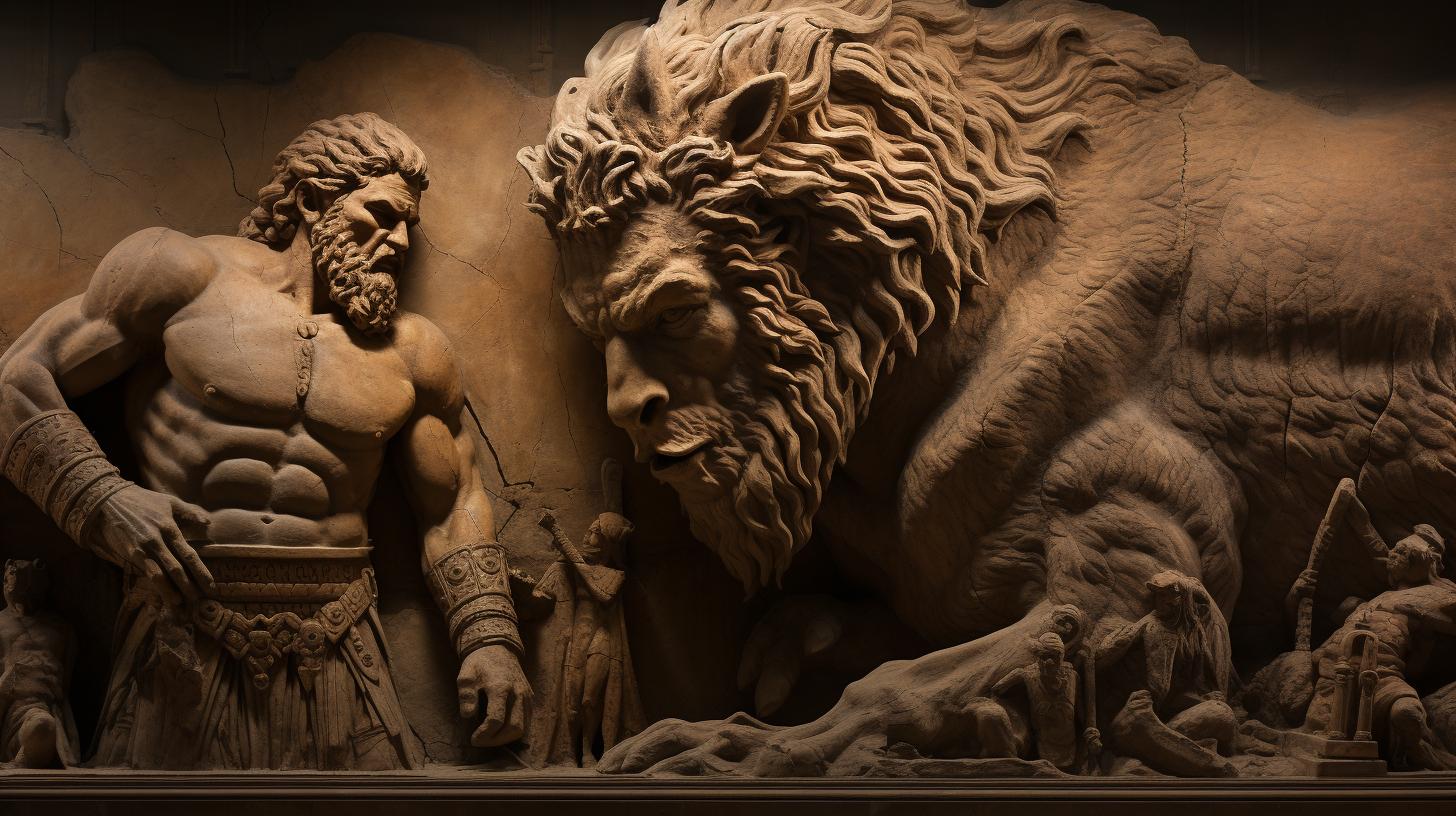
Gilgamesh and the Bull of Heaven is an ancient Sumerian epic depicting the clash between the mighty king, Gilgamesh, and the divine creature sent by the goddess Inanna/Ishtar. This epic battle showcases Gilgamesh’s prowess as a warrior, while shedding light on Inanna’s revenge and her manipulation of gods to unleash the destructive power of the Bull.
An exploration of their motives, the symbolism, and the cultural significance of this tale provides insights into the rich mythology of ancient Mesopotamia. Join us as we delve into the captivating world of Gilgamesh and the Bull of Heaven.
Gilgamesh and the Bull of Heaven Summary
The epic tale of Gilgamesh and the Bull of Heaven encompasses thrilling battles, legendary friendships, and divine interventions. In this retelling, we delve into the heart of the story, beginning with the epic battle that ensues between Gilgamesh and the fearsome Bull of Heaven.
The clash of strength and will unfolds as Gilgamesh proves his mettle against this formidable opponent.
The Epic Battle Unleashed!
As the Bull of Heaven descends upon the earth with its devastating wrath, Gilgamesh finds himself facing a perilous challenge. With unfailing courage and determination, he clashes with the celestial beast, their duel echoing across the ancient lands.
The ground shakes, the sky trembles, and the tale of this monumental battle reverberates through the annals of history.
Unraveling the Legends: Gilgamesh and Enkidu
Beyond the epic battle, we explore the legendary bond between Gilgamesh and Enkidu. Together, they embark on heroic adventures, forging a friendship that defies the odds. Their unique camaraderie serves as a pillar of strength throughout their quest, shaping their destinies and leaving an indelible mark on the story.
From their initial meeting to their shared triumphs and personal growth, Gilgamesh and Enkidu’s legendary exploits intertwine with the overarching narrative, painting a vivid picture of heroism, loyalty, and the transformative power of friendship.
Gilgamesh and Enkidu: The Dynamic Friendship
The epic tale of Gilgamesh and the Bull of Heaven also delves into the deep bond between Gilgamesh and his loyal friend, Enkidu. This friendship serves as a central theme, highlighting the power of companionship and its profound impact on the lives of these legendary characters.
Gilgamesh, the mighty king of Uruk, encounters Enkidu, a wild and untamed man created by the gods in response to Gilgamesh’s oppressive rule. Initially, these two figures clash in a ferocious battle, reflecting their conflicting natures and strengths.
However, this intense confrontation evolves into a profound connection that would define their journey together.
Enkidu’s untamed nature, deeply connected to the natural world, complements Gilgamesh’s strength and power as a ruler. Together, they embark on epic adventures, facing formidable foes, such as the terrifying Bull of Heaven unleashed upon them by the enraged goddess Inanna.
The bond between Gilgamesh and Enkidu strengthens with each triumph and challenge they face side by side.
Their friendship becomes a source of support, guidance, and solace for both Gilgamesh and Enkidu. In the face of mortality and their shared quest for immortality, their bond provides the emotional foundation that propels them forward.
It is through their friendship that they discover not only their own humanity but also a deeper understanding of the world around them.
The dynamic friendship between Gilgamesh and Enkidu showcases the transformative power of true companionship. Their friendship serves as a reminder that, even in the face of adversity and cosmic challenges, having a steadfast companion can bring solace, strength, and meaning to one’s life.
The story of their friendship resonates with readers, offering timeless lessons about the value of genuine connection and the impact of human relationships.
The Story of Gilgamesh and Enkidu: A Journey of Adventure and Growth
Embark on an epic journey through the captivating tale of Gilgamesh and Enkidu, a friendship that would shape the destiny of heroes and challenge the boundaries of mortality.
As the story unfolds, we are introduced to the restless spirit of Gilgamesh, the mighty king of Uruk. His thirst for adventure and boundless strength propel him to seek out a companion equally worthy of his valor.
Enter Enkidu, a wild man raised by animals in the wilderness. Bound by fate, Enkidu confronts Gilgamesh, leading to a fierce battle that ultimately unites them in kinship. Together, they embark on a series of courageous exploits, venturing into uncharted territories and facing formidable challenges that test the limits of their abilities.
Throughout their journey, Gilgamesh and Enkidu encounter mystical creatures, navigate treacherous landscapes, and cross paths with powerful deities. These encounters serve as catalysts for both physical and spiritual growth, as the duo confronts their innermost fears and grapples with the essence of their humanity.
As they face adversity, Gilgamesh and Enkidu develop resilience, wisdom, and a deeper understanding of their roles as mortals in a vast and unpredictable world. Their exploits become legendary, inspiring future generations with their awe-inspiring deeds and showcasing the enduring power of friendship.
With each passing challenge, the bond between Gilgamesh and Enkidu strengthens, their shared experiences shaping them into formidable heroes. Together, they demonstrate the true strength of human connection and the unyielding spirit that drives them forward.
The Story of Gilgamesh and Enkidu: A Journey of Adventure and Growth is an enthralling testament to the indomitable human spirit, reminding us that even in the face of seemingly insurmountable odds, the power of friendship and personal growth can overcome any obstacle.
Exploring the Motives: Why Did Gilgamesh Kill the Bull of Heaven?
The epic tale of ‘Gilgamesh and the Bull of Heaven’ presents a fascinating exploration of the motives behind Gilgamesh’s decision to slay the divine creature. This act of heroism and defiance had significant implications within the context of the story, shedding light on human-divine dynamics and unraveling the complex web of power struggles and revenge.
Unveiling the Divine Wrath: Inanna’s Revenge
At the heart of this motive lies the vengeful nature of the goddess Inanna. Having been rejected by Gilgamesh when she propositioned him, Inanna sought to assert her power and avenge her wounded pride.
She saw an opportunity for retribution in the form of the Bull of Heaven, a fearsome creature endowed with divine wrath.
Inanna, driven by her desire for vengeance, beseeched the god Anu to grant her the Bull of Heaven as a tool to punish Gilgamesh.
Initially, Anu refused her request, recognizing the destructive potential of the bull. However, Inanna’s threats to disturb the cosmic order and unleash chaos compelled Anu to yield to her demands.
The Power Play: Inanna’s Manipulation of Anu and the Bull
Inanna’s manipulation and cunning played a significant role in the ultimate decision to unleash the Bull of Heaven. By leveraging her status as a powerful goddess and exploiting Anu’s fears, she successfully attained her goal of obtaining the bull as a means of wreaking havoc upon Gilgamesh.
Through her machinations, Inanna demonstrated her willingness to use her divine influence to manipulate higher powers and bend them to her will. This power play not only showcased Inanna’s determination to exact revenge but also underscored the precarious relationship between mortals and gods in the ancient Mesopotamian worldview.
- Exploiting Anu’s hesitation, Inanna skillfully exploited the god’s fear of her potential disruptive power, forcing his hand in granting her request.
- Inanna’s manipulation of Anu and the Bull of Heaven exemplifies her deep-rooted desire for control and her ability to bend even the most powerful gods to her whims.
- Her calculated maneuvers serve as a reminder of the complex dynamics between mortal and divine powers, emphasizing the influential role of personal vendettas and power struggles in shaping the narrative.
As the tale unfolds, the motives behind Gilgamesh’s decision to confront and kill the Bull of Heaven become increasingly clear.
The clash between divine wrath, mortal defiance, and the intricate web of power dynamics form a captivating backdrop against which Gilgamesh’s ultimate fate is determined.
The Lord of Uruk: Gilgamesh’s Reign and Kingship
Gilgamesh, the mighty king of Uruk, held dominion over his empire with unrivaled power and authority.
His rule was marked by a remarkable legacy that extended beyond mere governance. As the lord of Uruk, Gilgamesh embodied the epitome of leadership, guiding his people with wisdom, strength, and justice.
Under Gilgamesh’s reign, Uruk flourished into a prosperous city-state, renowned for its grandeur and cultural vibrancy. The king’s insatiable appetite for greatness led to unprecedented feats of architecture, as he oversaw the construction of magnificent temples and monumental structures that adorned the city’s landscape.
As a ruler, Gilgamesh displayed a strong sense of justice. He established laws and regulations that ensured the well-being of his subjects, providing a stable and harmonious society. The people trusted in his ability to administer fair and impartial judgement, seeking solace and resolution in his courts.
Despite his great power, Gilgamesh was not blinded by his position. He recognized the importance of nurturing alliances and maintaining peaceful relationships with neighboring kingdoms. Through diplomacy and strategic alliances, he secured Uruk’s interests and protected his realm from external threats.
While his reign was marked by prosperity and triumph, Gilgamesh was not without his flaws. His insatiable thirst for immortality pushed him to embark on a perilous quest, defying the natural order.
It was through this journey that he confronted his mortality and realized the fleeting nature of human existence.
The story of Gilgamesh’s reign and kingship offers profound insights into the complexities of leadership, the responsibilities of power, and the fragility of human ambition.
By examining the impact of Gilgamesh’s rule on Uruk and its people, we gain a deeper understanding of the intricate dynamics between a ruler and his realm.
Facing Mortality: Gilgamesh’s Quest for Immortality
Gilgamesh, the mighty king and warrior, embarks on a perilous quest in his relentless pursuit of immortality.
Consumed by a fear of death and driven by a desire for eternal life, Gilgamesh is determined to find a way to escape the inevitability of mortality.
In his quest, Gilgamesh seeks out Utnapishtim, the only human believed to have achieved everlasting life.
Utnapishtim survived the Great Flood and was granted immortality by the gods. Gilgamesh hopes to learn the secret of immortality from him.
Throughout his journey, Gilgamesh faces numerous trials and challenges.
He braves treacherous terrains, battles terrifying monsters, and endures hardships beyond measure. But despite his strength and courage, Gilgamesh eventually realizes the futility of his quest.
Utnapishtim, recognizing Gilgamesh’s true nature, challenges him to stay awake for six days and seven nights, as a test of his worthiness for immortality.
But Gilgamesh fails this test, succumbing to exhaustion and sleep. Utnapishtim reveals that immortality is not meant for mortals, as death is a natural part of the human experience.
This revelation triggers a profound transformation within Gilgamesh.
He learns to accept his mortality and embrace the beauty and significance of life. Through his journey, he discovers that true immortality lies not in physical existence but in leaving a lasting legacy through deeds and accomplishments.
Gilgamesh returns to his city of Uruk, forever changed by his encounter with Utnapishtim. He reigns as a wise and compassionate king, promoting justice, nurturing his people, and leaving behind a legacy that continues to inspire generations to come.
The Role of Inanna, the Goddess of Love and War
In the epic tale of Gilgamesh and the Bull of Heaven, an intriguing and complex character emerges: Inanna, the goddess of love and war.
Inanna plays a pivotal role in the narrative, acting as both a catalyst and a source of conflict.
As the goddess of love, she embodies passion, desire, and sensuality. Her association with war highlights her fierce and combative nature. It is within this duality that Inanna’s power and influence over the mortal realm are revealed.
As the goddess of love, Inanna possesses the ability to bestow blessings upon those she favors, granting them beauty, fertility, and prosperity. This aspect of her character is evident in her attempts to gain Gilgamesh’s affections, as she proposes marriage to the mighty king.
However, Gilgamesh’s refusal and rejection of her advances lead to her wrath, and she seeks revenge by sending the Bull of Heaven to punish him.
Inanna’s role as the goddess of war further complicates the dynamics of her relationship with Gilgamesh.
She wields immense power and possesses a strategic mind, as seen in her manipulation of the god Anu to obtain the Bull of Heaven. Her actions showcase an intelligence and cunning rarely attributed to female deities in ancient Mesopotamian mythology.
Throughout the epic, Inanna’s character serves as a reflection of the complexities of human nature. She embodies the desire for love, power, and vengeance, encapsulating the qualities that make mortals both admirable and fallible.
The contrast between her divine status and mortal desires adds depth to the narrative and brings to light the intricacies of the human experience.
Symbolically, Inanna’s presence highlights the themes of passion and the consequences of interfering with the natural order.
Her interactions with Gilgamesh shed light on the delicate balance between divine and mortal realms, highlighting the inevitable consequences when mortal aspirations encroach upon the divine domain.
Through Inanna’s role as the goddess of love and war, the epic explores the complexities of human emotions, the allure of power, and the boundaries set by the divine.
Her character adds depth and intrigue to the narrative, making her an essential component in unraveling the epic tale of Gilgamesh and the Bull of Heaven.
Singing the Holy Epic: The Cultural Significance of Gilgamesh and the Bull of Heaven
The epic tale of Gilgamesh and the Bull of Heaven holds immense cultural significance, reflecting the values and beliefs of ancient Mesopotamian society.
This legendary story resonates with themes of power, divinity, and the human condition, providing profound insights into the civilization that birthed it.
Through the dynamic characters of Gilgamesh and the Bull, this epic explores the delicate balance between mortals and gods, showcasing the undeniable influence of deities on human lives.
The divine wrath exhibited by the goddess Inanna highlights the belief in divine intervention and the consequences of defying higher powers.
Furthermore, the story delves into the concept of heroism and the pursuit of immortality.
Gilgamesh’s quest for eternal life transcends time and culture, addressing the universal human longing for immortality and the inherent struggles faced when confronted with mortality.
The role of Inanna, the goddess of love and war, is particularly significant in understanding gender dynamics in ancient Mesopotamia.
Her power play and manipulation of Anu and the Bull shed light on the complexity of gender relations and the portrayal of female deities as both divine rulers and vengeful entities.
Another cultural aspect depicted in this epic is the importance of music and storytelling. The musicians of Gilgamesh, though lesser-known characters, play a crucial role in preserving and transmitting the holy epic through the generations, emphasizing the influential role of oral tradition in Mesopotamian culture.
This ancient narrative also reveals underlying values of loyalty, friendship, and the human capacity for personal growth. The dynamic bond between Gilgamesh and Enkidu exemplifies the transformative power of companionship and the potential for individuals to evolve and find purpose through their relationships.
Overall, ‘Gilgamesh and the Bull of Heaven’ stands as a testament to the rich cultural heritage of ancient Mesopotamia, offering insights into their religious beliefs, gender dynamics, and the human quest for power, immortality, and meaning.
This epic continues to captivate modern audiences, transcending time and geography to remind us of the enduring relevance and significance of these ancient tales.
Unveiling the Symbolism: Lugal Gabajal and The Tethering Stakes
Within the captivating tale of ‘Gilgamesh and the Bull of Heaven,’ there lies a profound symbolism that adds depth and meaning to the narrative.
One such symbolism is found in the enigmatic figure of Lugal Gabajal and the concept of The Tethering Stakes. These symbolic elements shed light on the intricate themes of power, control, and divine authority.
Lugal Gabajal, often referred to as the Lord of the Great Stakes, represents the embodiment of authority and governance. His role in the epic serves as a mirror to the power dynamics at play between gods and mortals, particularly Gilgamesh.
Just as Lugal Gabajal controls and tethers the unruly bulls, so does he symbolize the divine order and the cosmic balance.
The Tethering Stakes, on the other hand, act as a metaphorical device that signifies the limitations and boundaries set by the gods.
In the context of Gilgamesh’s journey, these stakes represent the constraints placed upon mortal ambitions and desires. They serve as a reminder that even the mightiest of individuals, like Gilgamesh, must recognize their place within the grand scheme of things and respect the divine realm.
The symbolism of Lugal Gabajal and The Tethering Stakes offers a profound reflection on the themes of power, hierarchy, and the innate struggle of mortals against their own limitations. It highlights the timeless existential quandary of human existence, wherein individuals are driven to reach beyond their boundaries, yet inevitably face the consequences of their actions.
As we delve deeper into the symbolic layers of ‘Gilgamesh and the Bull of Heaven,’ the presence of Lugal Gabajal and The Tethering Stakes beckons us to ponder our own desires, ambitions, and aspirations.
It invites us to contemplate the delicate balance between power and humility, urging us to navigate the complexities of our own mortal journey with reverence and respect for the cosmic order.
Myth vs. Reality: Separating Fact from Fiction in Gilgamesh’s Great Slurps With Each Slurp
Throughout the captivating tale of Gilgamesh and the Bull of Heaven, there are various mythological elements intertwined with reality, raising questions about what truly happened in Gilgamesh’s legendary encounter. One of the most intriguing aspects is the infamous “Great Slurps With Each Slurp” event, where Gilgamesh supposedly achieved unprecedented feats by consuming mystical elixirs.
Many scholars have debated the authenticity of these claims, as they seem to blur the lines between mythology and historical accounts. While ancient texts describe Gilgamesh consuming slurps that granted him extraordinary powers, it’s important to approach such narratives with a critical eye, recognizing the potential embellishments and symbolic meanings behind the stories.
One interpretation suggests that the “Great Slurps With Each Slurp” symbolize the inner transformation and personal growth that Gilgamesh undergoes throughout his journey. The slurps could be metaphorical, representing profound experiences that shape his character and mold him into a more enlightened and empathetic individual.
Another perspective contends that the notion of literal slurps is mere myth, used as a literary device to convey Gilgamesh’s extraordinary abilities and larger-than-life persona. These exaggerated accounts may serve to emphasize his status as a revered figure, embodying heroism and divine prowess in the eyes of ancient Mesopotamian society.
Separating fact from fiction in this regard is challenging, as the historical context and the narrative’s mythical elements intertwine. It’s crucial to consider the cultural significance of storytelling in ancient civilizations, where legends often served to uphold morals, transmit cultural values, and enthrall audiences.
While we may never definitively determine the reality behind Gilgamesh’s great slurps, it is the exploration and contemplation of these myths that enrich our understanding of the epic and the cultural tapestry of ancient Mesopotamia.
By delving into the symbolism and unraveling the layers of storytelling, we can gain deeper insights into Gilgamesh’s complex character and the enduring legacy of this remarkable tale.
The Musicians of Gilgamesh: Exploring the Role of His Musician(s)
Music has always played a significant role in human culture and society, and the ancient epic of Gilgamesh is no exception.
In our exploration of Gilgamesh and the bull of heaven, we must delve into the fascinating role of the musicians who accompanied the legendary king on his quests and adventures.
The musicians of Gilgamesh held a crucial position in his court, utilizing their skills to not only entertain but also communicate and invoke emotions. Music was believed to have a profound impact on both the mortal realm and the divine, and the musicians of Gilgamesh were the conduits through which this power flowed.
These talented individuals played a variety of instruments, each with its unique sound and purpose. They skillfully used harps, flutes, lyres, and drums to create melodies that resonated with the hearts and minds of the listeners.
Whether it was a joyous celebration or a moment of deep contemplation, the musicians of Gilgamesh set the tone for the events and interactions that unfolded.
- The Harpist: At the center of the musical ensemble was the harpist, whose nimble fingers danced across the strings, creating enchanting melodies that brought solace and inspiration to Gilgamesh and his comrades.
- The Flautist: The ethereal sound of the flute served as a bridge between the mortal realm and the divine, evoking emotions and connecting the listener to the spiritual essence of the epic tale.
- The Lyre Player: With their rhythmic strumming and gentle chords, the lyre players added depth and texture to the musical arrangements, enhancing the storytelling and invoking a sense of nostalgia and longing.
- The Drummer: The powerful beats of the drums echoed through the land, energizing the warriors and fueling their strength as they faced the challenges presented by the bull of heaven.
Beyond their musical prowess, the musicians of Gilgamesh held a deeper role in the narrative.
Their melodies served as a way to communicate with the deities, invoking their favor and protection during perilous encounters. Through their music, they offered prayers, expressed gratitude, and sought guidance from the divine forces that watched over the epic hero.
The musicians of Gilgamesh were not mere entertainers; they were integral to the unfolding of the epic’s events. Their melodies stirred the hearts of the characters and connected them to the larger themes of the story – friendship, love, loss, and the eternal search for meaning and immortality.
They provided the soundtrack to the extraordinary journey of Gilgamesh and brought the narrative to life through their harmonies.
In conclusion, the musicians of Gilgamesh played a pivotal role in the ancient Sumerian epic, enhancing the storytelling, invoking emotions, and connecting mortals with the divine. Through their mastery of various instruments, they added depth and resonance to the events in Gilgamesh’s quest, and their melodies became a guiding force in his ventures.
Their significance extends beyond mere entertainment, reminding us of the transcendent power of music in shaping both individual narratives and the collective human experience.
Gilgamesh and the Bull of Heaven: Insights from Oxford University Press
Discover the fascinating insights and scholarly analysis of the ancient Sumerian epic, ‘Gilgamesh and the Bull of Heaven,’ as presented by Oxford University Press.
In this in-depth exploration, distinguished academics delve into the rich symbolism, cultural significance, and literary motifs found within this timeless tale.
The Historical Context:
Examining the historical context of ‘Gilgamesh and the Bull of Heaven,’ scholars shed light on the political, social, and religious dynamics prevalent in ancient Mesopotamia. By analyzing the characters, settings, and narrative structure, these experts unveil the interconnectedness between mythology and actual historical events.
Symbolism and Allegory:
Delve into the layers of symbolism and allegory embedded in the epic. Oxford University Press scholars explore the deep-rooted meaning behind characters like Gilgamesh and Enkidu, as well as their symbolic representation of human virtues, wisdom, and the pursuit of immortality.
The Role of Inanna:
Unveil the multifaceted role of Inanna, the goddess of love and war, in ‘Gilgamesh and the Bull of Heaven.’ Oxford University Press experts analyze her motivations, actions, and the intricacies of her power dynamics within the divine pantheon, offering new insights into the ancient veneration of female deities.
Cultural Significance:
Discover why ‘Gilgamesh and the Bull of Heaven’ has endured throughout the centuries and holds immense cultural significance. Oxford University Press scholars contextualize the epic within Mesopotamian society, exploring its impact on religious practices, literature, and even modern adaptations.
Interpretive Debates:
Engage with the ongoing scholarly debates surrounding ‘Gilgamesh and the Bull of Heaven.’ Oxford University Press presents multiple perspectives on various interpretive challenges, inviting readers to form their own understanding of the epic’s themes, messages, and moral implications.
Step into the academic realm of Gilgamesh studies with Oxford University Press’s profound insights, meticulous research, and thought-provoking analysis of ‘Gilgamesh and the Bull of Heaven.’
.

